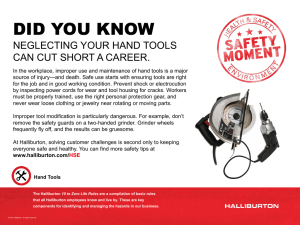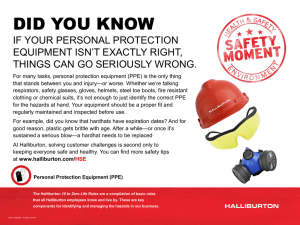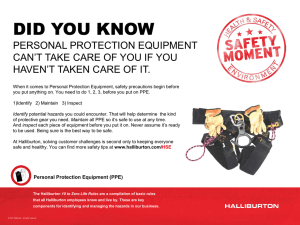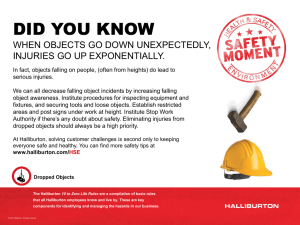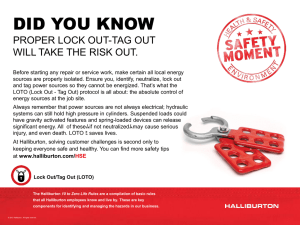Senator Byron L. Dorgan
advertisement
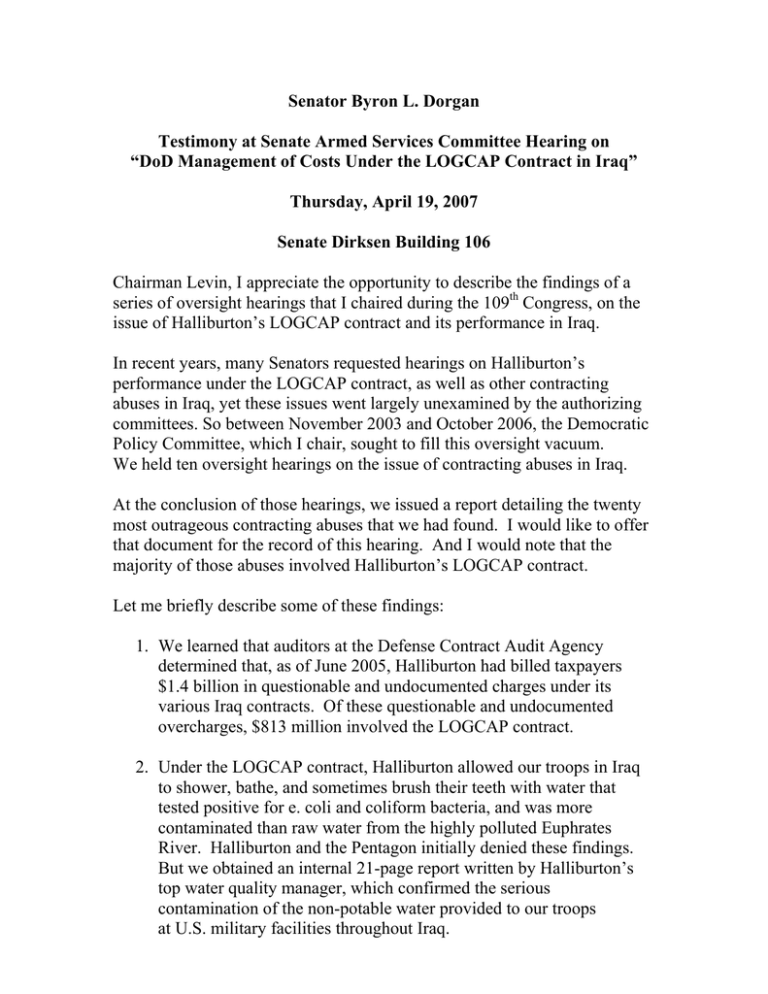
Senator Byron L. Dorgan Testimony at Senate Armed Services Committee Hearing on “DoD Management of Costs Under the LOGCAP Contract in Iraq” Thursday, April 19, 2007 Senate Dirksen Building 106 Chairman Levin, I appreciate the opportunity to describe the findings of a series of oversight hearings that I chaired during the 109th Congress, on the issue of Halliburton’s LOGCAP contract and its performance in Iraq. In recent years, many Senators requested hearings on Halliburton’s performance under the LOGCAP contract, as well as other contracting abuses in Iraq, yet these issues went largely unexamined by the authorizing committees. So between November 2003 and October 2006, the Democratic Policy Committee, which I chair, sought to fill this oversight vacuum. We held ten oversight hearings on the issue of contracting abuses in Iraq. At the conclusion of those hearings, we issued a report detailing the twenty most outrageous contracting abuses that we had found. I would like to offer that document for the record of this hearing. And I would note that the majority of those abuses involved Halliburton’s LOGCAP contract. Let me briefly describe some of these findings: 1. We learned that auditors at the Defense Contract Audit Agency determined that, as of June 2005, Halliburton had billed taxpayers $1.4 billion in questionable and undocumented charges under its various Iraq contracts. Of these questionable and undocumented overcharges, $813 million involved the LOGCAP contract. 2. Under the LOGCAP contract, Halliburton allowed our troops in Iraq to shower, bathe, and sometimes brush their teeth with water that tested positive for e. coli and coliform bacteria, and was more contaminated than raw water from the highly polluted Euphrates River. Halliburton and the Pentagon initially denied these findings. But we obtained an internal 21-page report written by Halliburton’s top water quality manager, which confirmed the serious contamination of the non-potable water provided to our troops at U.S. military facilities throughout Iraq. 2 We then received an e-mail from a U.S. Army doctor in Iraq, who found a number of cases of bacterial infections among the troops and traced those infections back to contaminated water provided by Halliburton. 3. Halliburton served the troops food that had spoiled or passed its expiration date. Halliburton managers ordered employees to remove bullets from food in trucks that had come under attack, then saved the bullets as souvenirs while giving the food to unwitting soldiers and Marines. 4. Halliburton charged taxpayers for services that it never provided and tens of thousands of meals that it never served. Rory Mayberry, a food production manager for Halliburton, said that he questioned the company’s decision to charge for meals that had never been served. He was told by managers that “this needed to be done because KBR lost money in prior months, when the government suspended some of the dining hall payments to the company. The managers said that they were adjusting the numbers to make up for the suspended payments.” 5. Halliburton actively discouraged cooperation by its employees with U.S. government auditors, sent one whistleblower into a combat zone to keep him away from auditors, and put another whistleblower under armed guard before kicking her out of the country. 6. Halliburton sent unarmed truck drivers into a known combat zone without warning them of the danger, resulting in the deaths of six truck drivers and two soldiers. Halliburton then offered to nominate the surviving truck drivers for a Defense Department medal — provided they sign a medical records release that doubled as a waiver of any right to seek legal recourse against the company. 7. Halliburton employees burned new trucks on the side of the road, far from any hostilities, because they didn’t have the right wrench to change a tire — and knew that the trucks could be replaced on a profitable “cost-plus” basis, at taxpayer expense. 8. Halliburton chose a subcontractor to build an ice factory in the desert even though its bid was 800 percent higher than an equally qualified bidder, profiting because of the cost-plus nature of the contract. 9. Halliburton double-charged taxpayers for $617,000 worth of soda. 3 10. Halliburton tripled the cost of hand towels, at taxpayer expense, by insisting on having its own embroidered logo on each towel. Henry Bunting, the Halliburton procurement officer who testified about this, said that it was very common for Halliburton managers to walk around saying “Get those requests placed. Remember, it’s all cost plus.” Some of the findings involve life-or-death failures or massive waste, fraud, and abuse. Some are smaller in scope. But taken together, these findings are a damning indictment of Halliburton’s performance under the LOGCAP contract – and seriously call into question whether the Department of Defense was minding the store. I am convinced that many of the problems with the LOGCAP contract have to do with the fact that the contract was awarded to Halliburton on a solesource basis. And I would urge that you consider the relevant provisions of S. 606, the Honest Leadership and Accountability in Contracting Act, which I believe would help prevent a recurrence of such abuses. I originally introduced this legislation towards the end of the 109th Congress, drawing on the findings of our DPC hearings on contracting abuses in Iraq, and working closely with Senators Leahy, Lautenberg, and Akaka, as well as Rep. Waxman. Our bill had the cosponsorship of 30 Senators. Some of the key provisions of that legislation deal with competitiveness in contracting. Sections 201 and 202 would prohibit the awarding of umbrella contracts over $100 million on a sole source basis, so that at least two companies would have to be awarded such contracts. The companies receiving the award would then compete for any “task order” costing more than $1 million. The provision would preclude a multi-billion dollar sole source award like Halliburton’s LOGCAP contract, by having some real price competition. Agencies would have waiver authority in cases where only a sole source contract was feasible, but would have to justify a waiver in writing and notify Congress. I would also commend to you a provision in S. 606 relating to war profiteering, which was originally authored by Senator Leahy. This provision establishes penalties of up to 20 years in prison and at least $1 million in fines for war profiteering. I think that we need to send a clear message that war profiteering will not be tolerated, and I find it unconscionable that current law does not do so. 4 Again, Mr. Chairman, I thank you for the opportunity to testify before this committee.

